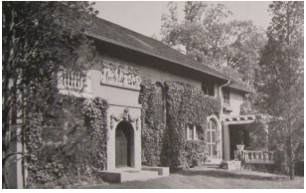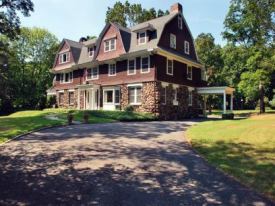Scarsdale Trustees Consider Revised Preservation Laws
- Monday, 03 June 2013 10:01
- Last Updated: Monday, 03 June 2013 10:11
- Published: Monday, 03 June 2013 10:01
- Hits: 4699
 Village Trustees continue to wrestle with the complexities of preserving Scarsdale's historic homes and landmarks without impinging on the rights of property owners. At a 5-28 meeting of the Law and Land Use Committees headed by David Lee and Jon Mark respectively, the newly elected Board held a working session to define their goals and explore ways to safeguard Scarsdale's heritage while allowing the Village to change to meet the needs of residents.
Village Trustees continue to wrestle with the complexities of preserving Scarsdale's historic homes and landmarks without impinging on the rights of property owners. At a 5-28 meeting of the Law and Land Use Committees headed by David Lee and Jon Mark respectively, the newly elected Board held a working session to define their goals and explore ways to safeguard Scarsdale's heritage while allowing the Village to change to meet the needs of residents.
The Village's current statute regarding historic preservation is reactive rather than pro-active. The Village only addresses preservation issues when an application for demolition is filed. There is nothing within the statute that allows the pre-designation of homes for protection. As a result, homes that might deserve preservation are not protected from renovations to the exterior or demolition.
Currently the Committee on Historic Preservation considers "certificates of appropriateness" from those wishing to demolish homes. Unless the committee finds that the home has historic significance, is 100+ years old, is related to an historically important individual, the work of architect or engineer of significance, a significant example of an important building style/period, or on the national/state register of historic places it can be torn down. Even when a home meets some of the above criteria, the argument is often not persuasive enough to safeguard the house.
In the wake of scores of teardowns of some of the Village's most treasured homes, the Village commissioned a Historic  Resources Survey that was conducted by Li/Salzman Architects and Preservationist Andrew S. Dolkart. The team identified individual homes and buildings worthy of preservation as well as "groups of building of high quality and with architectural integrity relating to their original design, create cohesive neighborhood ensembles." The results of the work were presented in April 2012.
Resources Survey that was conducted by Li/Salzman Architects and Preservationist Andrew S. Dolkart. The team identified individual homes and buildings worthy of preservation as well as "groups of building of high quality and with architectural integrity relating to their original design, create cohesive neighborhood ensembles." The results of the work were presented in April 2012.
Trustees agree that new code is required and are working on designing a new process to govern historic preservation. However, Trustee David Lee cautioned that historic preservation law should not be a weapon to prevent further development in Scarsdale. He believes there is a need to separate the issues of preservation and development.
Current thinking is that the Village will continue to charge the Committee for Historic Preservation with considering demolition applications but will narrow the criteria for preservation.
The new criteria would be more black and white than the current list and take the subjectivity out of the decisions about what should be preserved and what can be razed.
Here are the proposed new criteria for preservation:
- A building related to a historically important individual or historic event
- The work of a historic architect or engineer of significance
- A listing on the National Register of Historic Places
Under the new criteria, a century old home with character and charm could not be protected simply for its aesthetic appeal and would need to meet the additional criteria above.
As a second step, residents or CHP members could nominate certain properties for historic designation by filing an application with the Committee. If the property was found to warrant preservation, Trustees discussed the possibility offering tax breaks to residents who make improvements to the historic elements of the home. Rather than getting an immediate tax increase for renovations, the new assessment would be phased in over a 10-year period to give residents an incentive to preserve historic elements of their homes. Though the abatement would end after ten years the tax breaks would incentivize homeowners to take appropriate steps to maintain the historic elements of their homes. Homeowners who object to the committee's decision would have the right to challenge it.
Trustees are still considering whether or not the Village can impose landmark status on a home without the owner's consent. Though some may view this status as an encumbrance, others argue that landmark status might give the home prestige and raise its value. Experience in other communities has shown that if landmark status requires owner consent, very few will consent.
At the conclusion of the meeting, the Trustees formed a small working group to revise the draft of the proposed code to reflect ideas from the session. A second meeting of the Law and Land Use Committees will be held on June 11, and the public is invited to provide ideas and feedback.






